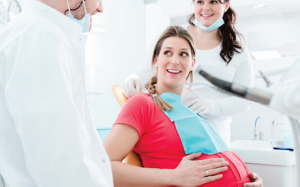“Have a baby, lose a tooth” goes the old wives’ tale, but how much truth is behind the myth? Not as much as there used to be, according to Ronald Hirth, M.D., of Hilltop OB/GYN.
“In the ages prior to modern medicine and widespread calcium supplementation, women who were pregnant would often lose teeth,” he says, adding that this was especially the case when women experienced poor nutrition and were pregnant or breastfeeding for several years in a row.
“Children will take what they want from you, and babies in the womb are no exception,” says Hirth. “During pregnancy and breastfeeding, there is a high demand for calcium from Baby to help form his bones. This calcium demand used to outpace the mother’s ability to replace it, and the baby would often continue to build bone at the expense of the mother.” As Mom’s calcium levels drop, he explains, her jawbones would recede enough to pull the gums and loosen teeth.
“Thankfully, given our modern nutrition with calcium and Vitamin D supplementation, prenatal vitamins, and pregnancy spacing with contraception, this doesn’t happen as often as it used to,” adds Hirth.
BLEEDING GUMS
Does it seem like your gums are suddenly bleeding every time you brush and floss your teeth? It’s all part of being an expecting mom.
“During pregnancy, the placenta makes a large amount of progesterone which keeps the muscle of the uterus relaxed,” says Hirth. “It also relaxes the tiny muscles around arteries and veins, causing them to dilate.” He explains that this is happening in all mucous membranes, including your mouth and nose, making tiny veins more susceptible to injury and bleeding — meaning you might not only be experiencing bleeding gums, but nosebleeds as well.
“While this may be completely normal and is a very common symptom, it is always a good idea to make sure your doctor knows about it and to see a dentist during the pregnancy because it could be a sign of some other underlying condition,” says Hirth. He adds that these symptoms usually reverse themselves after pregnancy and breastfeeding.
DENTIST VISITS & PRENATAL VITAMINS
Unless you’re experiencing a problem, Hirth says you really don’t need to see your dentist more often during your pregnancy, but stick to your regular cleaning schedule.
And stick to your supplements and prenatal vitamins! “All pregnant and breastfeeding women should consume 1,000 mg of calcium from supplements and food every day,” says Hirth. “They should also consume 600 IU of Vitamin D a day.” He advises future moms not to skimp here.
“Many women don’t take their prenatal vitamin because ‘I didn’t take it with my first pregnancy and my baby turned out fine.’ What they don’t realize is the prenatal vitamin is mainly for their own health. Taking it helps keep your bones strong, helps to avoid anemia and blood transfusions, and keeps your hair and nails healthy.” Teeth, too!





